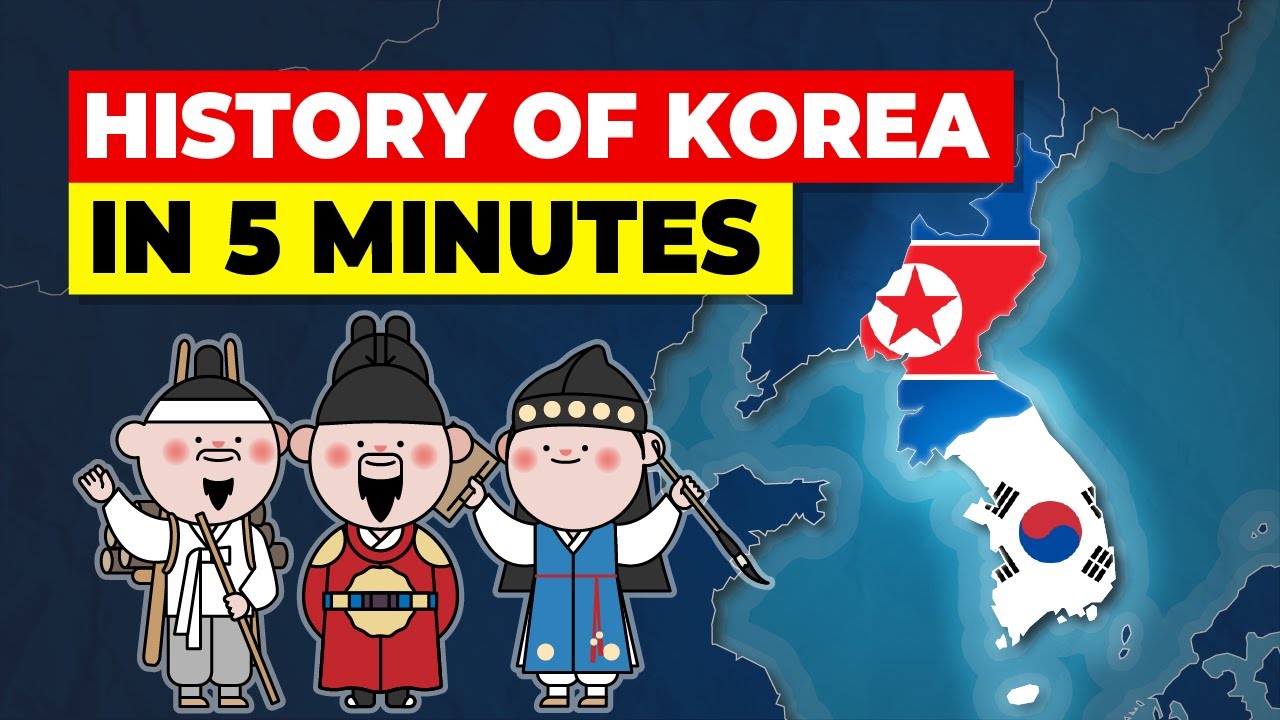Korean Three Kingdoms Period explained (History of Korea)
Summary
TLDRThis video explores the ancient Three Kingdoms period in Korean history, detailing the rise and fall of Baekje, Silla, and Goguryeo. It covers the political and military struggles, shifting alliances, and the influence of external powers like China and Japan. The script also highlights key monarchs, significant battles, and the eventual unification under Silla, setting the stage for the later Three Kingdoms period. Sponsored by Squarespace, the video offers a comprehensive look at this pivotal era.
Takeaways
- 🏰 The Three Kingdoms period in ancient Korean history was a time of political and military rivalry among three dominant kingdoms: Baekje, Silla, and Goguryeo, with the Gaya Confederacy also playing a significant role.
- 🌐 The Korean Peninsula was initially divided between Goguryeo in the north and the Jin Confederacy in the south, which later led to the formation of the Samhan Confederations.
- 👑 Goguryeo was the first to form a centralized state, followed by Baekje and Silla, which gradually took over their respective confederations and centralized power behind a single monarch.
- ⚔️ The region maintained a delicate balance of power with external influences from Imperial China to the west and the Japanese kingdom of Wa to the southeast.
- 🔥 Goguryeo expanded significantly under King Gwanggaeto, conquering territories in what is now China, Russia, and Inner Mongolia, and even repelling invasions from the kingdom of Wa.
- 🏰 During King Jangsu's reign, Goguryeo reached its Golden Age with economic prosperity and cultural development, and he became the longest-reigning monarch in East Asian history.
- 🛡️ Goguryeo built a 300-mile wall to deter invasions, which was effective for a time but eventually failed to stop the Chinese invasions.
- 🏹 The fall of Goguryeo was marked by internal strife and external pressures, including a failed alliance with Baekje against Silla, leading to its conquest by the Tang dynasty.
- 🏛️ Silla, after an initial period of peace and prosperity, faced resistance to its assimilation policies, leading to the emergence of rebel kingdoms that would later become Goryeo and Baekje.
- 🌟 The Goryeo dynasty reunified the peninsula, marking the end of the Three Kingdoms period and the beginning of a new era in Korean history.
Q & A
What were the three rival kingdoms that dominated the Korean Peninsula during the Three Kingdoms period?
-The three rival kingdoms were Baekje, Silla, and Goguryeo.
Why is the Gaya Confederacy not considered one of the three kingdoms?
-The Gaya Confederacy did not form a single kingdom but reorganized into the six slightly larger states of the Gaya Confederation, unlike the other three kingdoms that centralized power behind a single monarch.
How did the Mahan Confederations form and what was its significance?
-The Mahan Confederations formed in the south during the first century BC as a coalition of 54 city-states, and it was the largest and most developed of the early confederations, eventually leading to the formation of Baekje and Silla.
What was the role of external powers like Imperial China and the Japanese kingdom of Wa during the Three Kingdoms period?
-External powers maintained a delicate balance of power in the region, with alliances frequently changing and influencing the political landscape of the Korean Peninsula.
How did Goguryeo establish itself as a formidable centralized state?
-Goguryeo was formed by a prince from Buyeo who fled southwards and began uniting the tribes of the north, eventually centralizing military power and foreign relations behind the king.
What significant events led to the decline of Goguryeo?
-Goguryeo faced significant setbacks including invasions by the Xianbei, internal power struggles, and attacks from Baekje, which eventually led to its decline.
What was the outcome of the alliance between Silla and Baekje against Goguryeo?
-The alliance between Silla and Baekje failed to drive Goguryeo out of the Korean Peninsula, and both states lost territory, with Baekje's king being captured and executed by Goguryeo.
How did Silla manage to conquer the other kingdoms and unify the Korean Peninsula?
-Silla took advantage of the weakened states of Baekje and Goguryeo due to internal conflicts and external invasions, and with the help of the Tang Dynasty of China, they conquered Baekje and later Goguryeo, unifying the peninsula.
What was the significance of King Gwanggaeto of Goguryeo's reign?
-King Gwanggaeto was a highly capable military leader who expanded Goguryeo's territory significantly, conquering 64 walled cities and over 1,400 towns and villages, and was known for his military campaigns against the Xianbei and the Japanese kingdom of Wa.
How did the Three Kingdoms period transition into the Unified Silla period?
-The period transitioned as Silla, with the help of the Tang Dynasty, conquered Baekje and Goguryeo, leading to the unification of the Korean Peninsula under Silla's rule.
Outlines

This section is available to paid users only. Please upgrade to access this part.
Upgrade NowMindmap

This section is available to paid users only. Please upgrade to access this part.
Upgrade NowKeywords

This section is available to paid users only. Please upgrade to access this part.
Upgrade NowHighlights

This section is available to paid users only. Please upgrade to access this part.
Upgrade NowTranscripts

This section is available to paid users only. Please upgrade to access this part.
Upgrade NowBrowse More Related Video

Full History of Korea in 5 Minutes

The History of Korea - Learn Korean History in Under 12 Minutes | 12분으로 보는 한국역사

A Super Quick History of South Korea

Sejarah Kerajaan Hindu-Buddha di Indonesia

Kerajaan Hindu Budha di Indonesia (Bagian 1) / Sejarah Kelas X/ Kurikulum Merdeka

Kerajaan Islam di Indonesia Bagian 1 / Sejarah Kelas X / Kurikulum Merdeka
5.0 / 5 (0 votes)